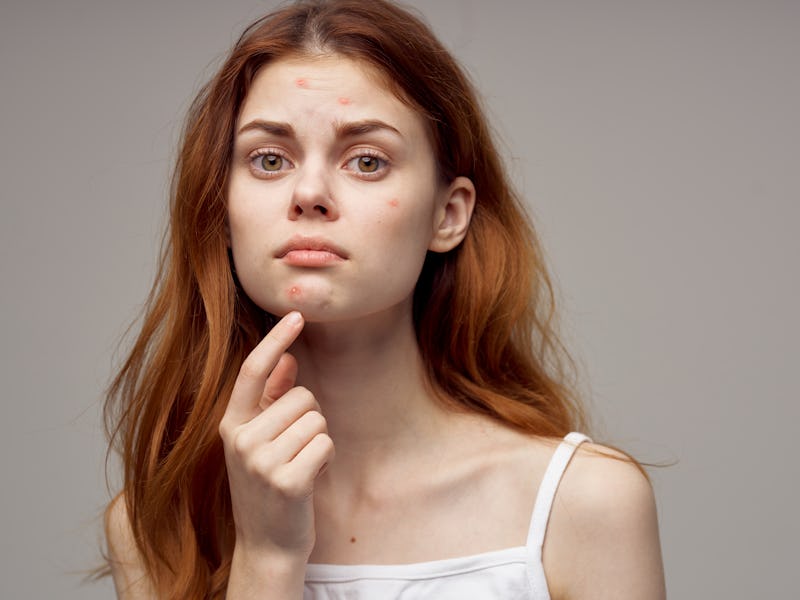Dermatologists say people with acne have 5 lifestyle factors in common
Acne is driven by the exposome.

If you’ve ever had a pimple (or ten), you know how anxiety-producing and stressful acne can be. While it can feel like you’re the only one without clear skin, one in 10 people will experience acne in their lifetime, making it the eighth most prevalent disease worldwide.
Despite the fact that acne is so common, there’s little consensus, or hard evidence, on what actually causes acne in the first place. In turn, that understanding could lead to future treatments that could help the 676 million people around the world who suffer from zits.
Unpublished research presented Friday at the 28th European Academy of Dermatology and Venereology Congress (EADV) in Madrid could provide some answers. At the meeting, scientists affiliated with Vichy Laboratories, a French skincare company, revealed the role of the exposome plays in acne development. The exposome is defined as “the sum of all internal and external environmental factors that impact the onset, duration, and severity of acne” — basically, all the things besides your genes and hormones, which may influence acne.
The study nails down the key exposome factors that trigger pimples and blackheads. These include: consuming certain foods and drinks (like soda, sweets, and alcohol), steroids, experiencing lots of stress, and air pollution. While some of these factors have been linked to acne before, this research is the first research-backed, holistic examination of all exposome factors.
Eating sweets, like chocolate cake, was a habit more often practiced by people with acne.
The hope is that, by specifically identifying these factors, the research can help people gain a bit more control in managing the likelihood of a breakout.
“Acne management should be holistic, including acne treatment and education regarding factors that can contribute to it,” co-author Delphine Keron, M.D., a dermatologist with Vichy Laboratories, explained to Inverse in a statement.
“Dermatologists need to know these factors to be able to discuss it with patients, including asking them about their consumption of whey proteins and steroids for example.”
"Acne management should be holistic.”
The study included 6,700 participants, who represented North America, South America, and Europe, and within this group, 2,826 had acne and 3,853 did not. Participants answered a survey that asked about ten exposome factors, including smoking, eating sweets, or feeling stressed.
The research found that people with acne reported certain habits more than people with clear skin. It was significantly more common for people with acne to consume dairy products, sweets, alcohol, and whey proteins. For example, those who ate pastries and chocolate more regularly were more likely to have acne; the same was true for those who more often drank soda.
People with acne were also significantly more exposed to pollution than those without, as well as anabolic steroids. In this study sample, 11.9 percent of acne sufferers consumed anabolic steroids, compared to the 3.2 who consumed the same but did not have acne.
Scientists still aren't certain exactly why people get pimples.
Being hard on the skin through the use of peels or harsh cleansers was also more prevalent in acne sufferers — which makes sense in light of the situation. People want to get rid of their acne, as quickly as possible and by any means necessary. In this case, the factors aren’t so much driving the acne, as they are simply coexisting with it.
To the scientist’s surprise, smoking or using tobacco, which has been previously thought to contribute to acne, didn’t seem to make a significant difference.
Conventional wisdom rules that bad hygiene and bad food show up on the face: People often think dairy leads to pimples, chocolate causes acne, greasy foods lead to whiteheads. But the evidence actually linking diet and acne has been mixed: Until 2007, research reviews found little evidence that diet causes acne, instead pointing to genetics and hormonal influences as culprits.
This study turns that assumption on its head, showing that people with acne have certain habits in common, which may be making their skin condition worse.
It’s important to note that the study pointed out associations, not causation. At this point, researchers can’t say definitively that people with acne live their lives in a way that causes their zits. But it does mean people can make lifestyle changes, on top of medication or other acne treatments, that could help clear their skin.
That help isn’t important for aesthetic reasons: Acne can cause pose serious psychological risks, especially to teens. Teenagers with acne are more likely to have mental health problems, social impairment, and suicidal ideation. Avoiding dairy, sugar, bad air and stress could help these teens, and all acne sufferers, get their skin under control.